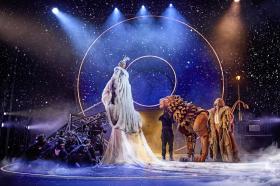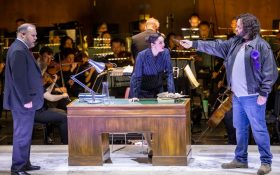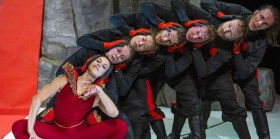Unless it’s a singalong with Martine McCutcheon’s Eliza Dolittle, George Bernard Shaw’s works are often bracketed as set text fodder: worthy of study but dated.
On the face of it Major Barbara is just such a play. Set in 1905, it is the story of the Undershaft family. Barbara Undershaft, brim full of missionary zeal, has her faith in her beloved Salvation Army shattered when her superiors accept badly needed funds from her estranged father Andrew (an armaments manufacturer) and a whisky baron named Bodger. Barbara is a believer who cannot compromise: she must save souls or have nothing at all and souls are not to be saved with morally tainted money.
Andrew Undershaft, whom Shaw claimed was the play’s real hero, insists throughout that nothing can be done without money and power, asserting that poverty is the real and only crime with which humanity should concern itself. Andrew’s munitions plant turns out not to be a Victorian death factory but the centre of a model community complete with ballroom, banqueting chamber and building society. Undershafts’ workers’ every need is met by a business that will obliterate millions of them in the trenches not ten years later.
There is much to provoke a wry wince from a contemporary audience. Heads of Hedge Funds are the new factory owners and, if you have succumbed to a company Blackberry, your boss can keep tabs on you 24/7 as well as providing your pension and private health plan. Bevan had not invented the welfare state in 1905 and workers were greatly dependent upon their employers’ munificence; a situation that continues in the USA today and may well return to these shores.
Once Barbara abandons the Salvation Army the subject of the action becomes a struggle for the soul of her fiancé Adolphus Cusins (a sort of irritatingly smug Chekhovian eternal student figure) whom, in accordance with a bizarre family tradition, Andrew Undershaft wishes to recruit as heir to the armaments business.
It is at this point that Nicholas Hytner’s spirited and largely enjoyable production begins to break down. In these days of consensus politics, suicide bombers and pontificating prelates we are grown somewhat suspicious of those whose beliefs are deeply held. In a world where everything is relative, it is difficult to care about how a character as unsympathetic as Adolphus Cusins chooses to earn a crust – let alone the state of his soul.
Paul Ready, who plays Cusins, suffers from having to share so many scenes with Simon Russell Beale’s Andrew Undershaft. Russell Beale’s commanding charisma and excellent comic timing threaten to undermine everyone else on stage. Ready does not help matters by continually standing far too close to Russell Beale and spitting the dialogue right into his face. The result is a somewhat tedious philosophical shouting match with none of the pathos of Barbara’s crisis of conscience.
George Bernard Shaw’s deserved reputation as a great comic playwright is in evidence in the scenes involving the rest of the family. It is worth buying a ticket just to see Clare Higgins as the indomitable Lady Britomat, struggling to kit her brood out for respectable middle-class Edwardian life.
Tom Pye’s excellent set makes full use of the vast Olivier stage, providing a stark contrast between the opulent Undershaft library and the prison mess hall gloom of the Salvation Army shelter. The factory might have come straight from a Soviet propaganda film with its row upon row of matter-of-fact gleaming bombs.
Some bewildering lighting changes and roaring noises in the second half, presumably intended to indicate moral climate change, only served as a distraction even more irritating than the several mobile phones that went off. Why do people switch them back on during the interval? Does their souls’ salvation rest on picking up messages by ten past nine? Wouldn’t it be lovely if I could truthfully say that one of the offending ringtones was Martine singing ‘Oh Wouldn’t It Be Lovely?’
Major Barbara runs at the National Theatre until 15 May 2008.




